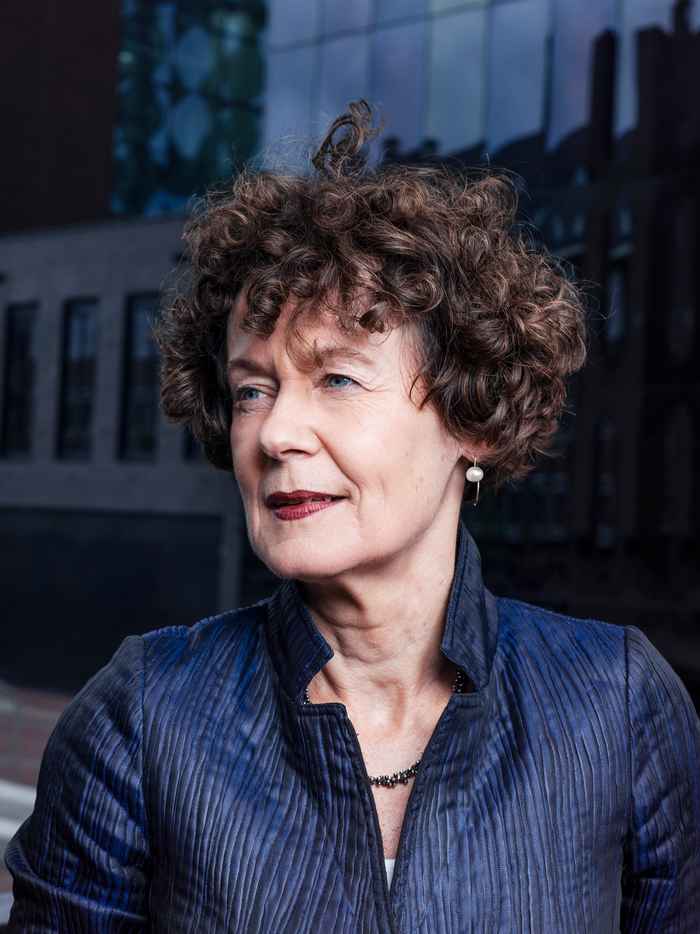Geert ten Dam

Who: Geert ten Dam (1958)
What: Professor of Educational Sciences and President of the UvA Executive Board
Studied: Andragogy, major in adult education
First job: Strawberry picking
Favourite place at the UvA: The Roeterseiland complex: a beautiful, interdisciplinary campus that has an open connection to the city both literally and figuratively.
Essential: My bicycle. I cycle from campus to campus and use the bicycle as a place to think.
She grew up in Oss, in the province of Brabant, and traded the countryside for Amsterdam and the UvA when she was eighteen, enrolling in the Andragogy programme. She then spent over forty years working at various levels of the University, from chair of the Education Council and Crown-appointed member of the Social and Economic Council of the Netherlands (SER), to President of the Executive Board. She combines her job as President of the Executive Board with both teaching and research in order to keep in step with the University.
What kind of Executive Board President are you?
‘When I was appointed President of the UvA Executive Board three years ago, I immediately made it clear that I wanted to continue teaching. Together with a colleague, I currently teach a Master's module called Educational Policy: system and governance. In the lectures, I link my experience that I have gained as chair of the Education Council and Crown-appointed member of the SER to theories concerning educational policy. I review current policy files with the students. They appreciate it and I enjoy it. I love the combination of education and research, so I did not abandon the research aspect when I became President of the Board, either. By combining my work as president of the UvA Executive Board with my research and teaching, I'm able to stay in step with the University. No one can tell me that I have no insight into the practical end of things. Contact with students and staff is also the reason why we relocated the administrative offices from the Maagdenhuis to the Roeterseiland Campus. I govern based on my own relevant experience. Education and research are part of this.’
The university has to be a part of its community.
To your mind, what qualities make the UvA special?
‘To me, the most defining trait of the UvA is the combination of top quality with social engagement. A university has to be a part of the community. The people who work here are of great value to society with their research and education, from both a short-term and a long-term perspective. And more than that, as a university, we are educating the next generation. Our greatest gift to society is educating these students with both the highest quality of knowledge and a sense of social responsibility. Universities are crucial to the innovative power and resilience of society. Social engagement is not a bonus; it is integrated into our core responsibilities.’
What is so important that it warrants the investment of additional energy?
‘Diversity. It is an important theme for the UvA. This must be a place where everyone feels appreciated, respected, safe and welcome. We recently drew up a diversity policy document in which we set the stage for appointing more female professors, among other things. A talent programme for PhDs with a migrant background is in the works. We have reintroduced the summer school for first-generation students and are expanding the mentor programmes aimed at students for whom the university is a completely new environment. I strongly oppose the idea that diversity diminishes excellence. From a fairness point of view and in terms of social needs, it is unacceptable for any student to miss out on a university education, or to fail to thrive in a university setting, simply because of their socio-cultural background. Although we are moving in the right direction, it is slow going. Sometimes I get impatient, but the attention for diversity is there and the conversation is actively being conducted. If we can do this together, that's something we can be proud of.
What's more, the UvA is ideally positioned to tackle social issues across the board, removing the walls that separate the various faculties and disciplines. That is our strength, but it is also our challenge. What can we do to ensure more interaction between disciplines? Interdisciplinary collaboration is a top priority on our innovation agenda.’
You aren't afraid to say what you stand for or what you think. Is that another quality that belongs at a university?
‘A university forms an ideal environment in which to be confronted with facts and opinions that conflict or even clash with your own. Open debate is our most prized asset. It's something we have to cherish and preserve. In my position it would be an illusion to think that you can please everyone, but dialogue is very important to me. You have to keep the conversation going: keep talking, but more importantly, keep listening. And I'm not afraid to say what I think about something. I'm not invested in my own comfortable position. I intend to do the best I can and hope to be held accountable for my responsibilities. There are wonderful aspects to my work, but it's a difficult job, too.’